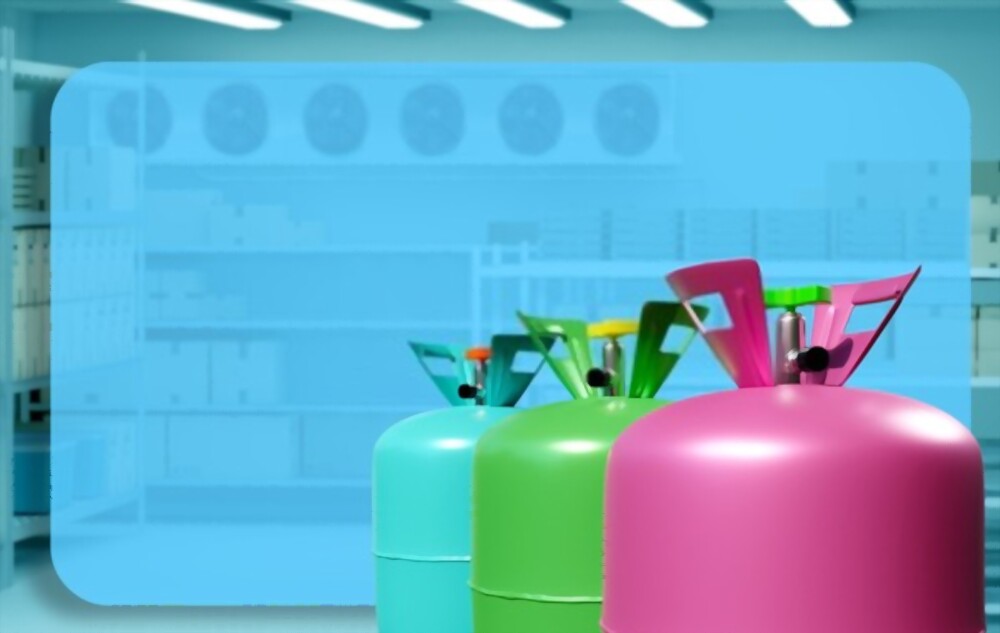In today’s rapidly advancing world, technology has made our lives much more convenient. One such innovation is the advent of refrigeration systems, which have revolutionized the way we store and preserve perishable items. Refrigerant gases play a crucial role in these systems, but they require careful handling and proper management to ensure both efficiency and safety.
This article aims to provide a comprehensive guide on how to do it correctly. By following the best practices discussed here, you can ensure your refrigeration system operates optimally, all while maintaining compliance with environmental regulations.
Understanding Refrigerant Freezing Gas
Freezing gases, commonly called ”refrigerants,” are crucial components in refrigeration and air conditioning systems. They enable the cooling process by absorbing heat from the surrounding environment and transferring it to the condenser for dissipation.
The most common refrigerants used in various systems include hydrofluorocarbons (HFCs), hydrochlorofluorocarbons (HCFCs), and hydrocarbons (HCs). However, it’s essential to be aware of their freezing points, as this can significantly impact the efficiency and performance of the refrigeration system.
The Impact of Freezing Point on Refrigeration Systems
When refrigerant gases freeze, it can lead to several problems within the refrigeration system. One primary concern is the potential blockage of pipelines and components, hindering the flow of the refrigerant. This blockage can reduce the cooling capacity, resulting in inadequate temperature control and potentially damaging the compressor.
Moreover, the formation of ice crystals in the system can cause wear and tear on the equipment, leading to costly repairs and decreased lifespan. To avoid these issues, it’s vital to handle refrigerant freezing gases properly and take preventive measures.
Preventive Measures for Handling Refrigerant Freezing Gas
Proper Temperature Management
Maintaining the correct operating temperature is critical to prevent refrigerants from freezing. Make sure the refrigeration system is operating within the recommended temperature range specified by the manufacturer. If the system is exposed to extremely low temperatures, consider using low-temperature refrigerants designed for such conditions.
Adequate Insulation
Insulate the refrigerant lines and components to prevent them from being exposed to external cold temperatures. Proper insulation will reduce the risk of refrigerant gas freezing within the system.
Regular Maintenance
Schedule regular maintenance checks for your refrigeration system. During these inspections, qualified technicians can identify and address any issues that might lead to refrigerant freezing.
Thawing Procedures
In the event that refrigerant freezing does occur, it’s essential to follow proper thawing procedures. Do not attempt to thaw the freezing gas rapidly, as it can cause pressure buildup and potential system damage. Allow the refrigerant to thaw naturally, and consult with a professional technician if necessary.
Use of Anti-Freezing Additives
Some refrigeration systems may benefit from the use of anti-freezing additives. These additives can help lower the freezing point of the refrigerant, reducing the risk of ice formation within the system.
Environmental Considerations
While proper refrigerant handling is essential for system efficiency, it is equally crucial to consider the environmental impact. Many traditional refrigerants, such as HCFCs and HFCs, contribute to ozone depletion and global warming. Therefore, it is vital to transition to more environmentally friendly refrigerants, such as hydrocarbons (HCs) or natural refrigerants like carbon dioxide (CO2) and ammonia (NH3).
By adopting eco-friendly refrigerants, you not only reduce the environmental footprint but also comply with international regulations and protocols aimed at phasing out harmful substances.
Refrigerant Recovery and Recycling
To further enhance environmental responsibility, consider implementing refrigerant recovery and recycling practices. Recovering refrigerants from old or malfunctioning systems and recycling them for reuse helps reduce greenhouse gas emissions and conserves valuable resources.
Several organizations and programs promote responsible refrigerant management, providing guidelines and support to businesses seeking to improve their sustainability practices.
Conclusion
Handling refrigerant freezing gas properly is crucial for the efficient operation of refrigeration and air conditioning systems. By understanding the impact of freezing points, implementing preventive measures, and considering environmental implications, you can ensure your system runs optimally while reducing its ecological footprint.

